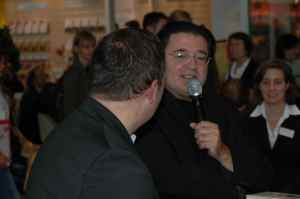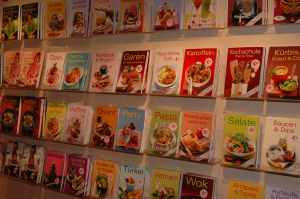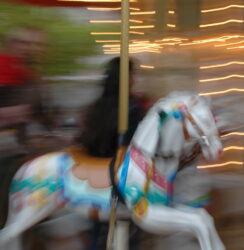
Strange quirk of fate. Bookish people are usually typed as barely noticeable, mousy folk, shrinking violets, wall flowers, and even worms. Yet they are eminently visible in Germany especially around the time of the Frankfurt Book Fair. On the train up to the city of banks, there were at least three in the compartment I boarded. One, a tall man, bald with very techno-specs, perhaps business something-or other. He had a luggage dolly the size of a small forklift with thick tyres. I took a seat at a table with, opposite me, an editor slaving away on some manuscripts in Spanish and French and a facial expression that said “Don’t talk to me.” But we did end up conversing in a strange manner. We talked about the business of publishing, the eminent threat of eBooks  and iPhones and other toys and the problems we encountered. Hers seemed to be vaguely related to too much work. Mine with editors not bothering to answer their emails. “We are overworked, I sometimes don’t even open my mails, there are so many,” she retorted, tersely. Well, I think, how much would it cost to hire someone to do it, lord knows, there are enough intelligent and capable people out of work right now. But instead, I point out that Hermann Hesse, besides all the novels and stories and poems, also wrote 35,000 letters on an old black typewriter. She looks at me: “I hate Hesse,” she says, and ends the conversation by staring intently at her manuscripts.
and iPhones and other toys and the problems we encountered. Hers seemed to be vaguely related to too much work. Mine with editors not bothering to answer their emails. “We are overworked, I sometimes don’t even open my mails, there are so many,” she retorted, tersely. Well, I think, how much would it cost to hire someone to do it, lord knows, there are enough intelligent and capable people out of work right now. But instead, I point out that Hermann Hesse, besides all the novels and stories and poems, also wrote 35,000 letters on an old black typewriter. She looks at me: “I hate Hesse,” she says, and ends the conversation by staring intently at her manuscripts.
Ten years since I was at the Book Fair, and my 5th visit in all. It remains the awesome orgy of the publishing industry, though there is a slightly melancholy air to it. Unless you hit the aisles with the esotericists, the politicals, the cooks. At my last visit, over 8,500 companies were there with their wares, some of the booths exuded the swirling energy of a Viennese waltz. But this year, the number of exhibitors was 6,936, while the number of titles was around 401,000, and there was quite enough space to move around in the great halls, a sign of serious slowing down. Many exhibitors mentioned this, hoping for more traffic during the weekend, when the fair is opened to the general public. I suspect they let in school classes on day 2 just to cook the books. An awful lot of people wearing ratty backpacks and too young and smiling to be editors, publishers, agents or journalists were stalling traffic in the aisles.
The booths come in all sizes, from single-author 1-square-meter cubby holes, to somewhat bombastic installations with full-fledged catering. Some have sofas, others little bistro tables decked out with cookies. Posters are everywhere, the biggest ones are devoted to the surefire hits, like the newest Dan Brown novel in German translation, which I will not read, having had to abandon both the Da Vinci Code and some book with a title involving the word digital because it read like something written by a bored high school kid. I saunter through the publisher’s hall where the Anglo-Saxons are located with their especially beautiful coffee table books and a plethora of children’s books. I read about a dragon who is too hot he can make toast. I find little books that can float and others that open up into 3D scenes. Some make music. One publisher produces books shaped like basketballs and footballs. Several booths are offering clip-on book lights. I manage to convince one marketing manageress to let me have the last copy of a certain book in a series that my daughter adores.

At the Press Center, Hoffman & Campe’s Günter Berg opened the ceremonies with a major coup: 89-year-old Marcel Reich-Ranicki, Germany’s one-man supreme court for literary decisions – who last year shocked the country by refusing a prize from the TV industry – is talking about the value of the old classics. He originally launched a series with the works of Kafka, Lessing, Kleist, Heine, Büchner and Schiller with Suhrkamp, but after a disagreement with the editor there, he took his ideas to H&C (except Schiller, which remained. Reich-Ranicki is sparing in his words, like someone who has returned to the basics after a lifetime of complexity. Readers will be astonished what they will find in those classics. Goethe is not on his list, because he cannot be categorized. As for the Nobel Prize winner, laconically he confesses he has not read her works, so it’s no comment from him. He seems very tired and as always, slightly bored. Hardly astonishing considering his own biography.

I go out and begin looking around for Herta Müller’s works, for a large, distinctive poster, for some lights and joy and celebration. There is none. I stumble across new novels that seem to be inspired from the pains of mid-life crises. There are sensationalist books about the crisis and the naughtiness of bankers, books with big red titles that promise the world and deliver steam. I come across author and commentator Leon de Winter mentioning the gradual separation of US Jews and the Israeli Jews, whom he describes as “warriors”. This all has to do with his vocal opposition to multiculturalism, surely, but it sounds like preening. He is sitting on the stage of the Frankfurter Allgemeine, which is staunchly conservative. I wander off, and a few minutes later, a young, very thin woman hands me a tiny book with excerpts from an erotic novel about some killer who has sex with her victims. Three sentences into the hormonal brew is enough to convince me that this is more emetic than erotic. Speaking of which: Cookbooks are ubiquitous. Many publishers seem to have them as a kind of security line. I find a woman is cutting prosciutto at one booth, Schinken (ham) in German refers to a big book… It’s meant to be funny, I guess, but she is not laughing.


Many booths are devoted to spiritual topics − entire stands are concerned with every religion under the sun − many to family life. A cursory glance down any of the aisles reveals a plethora of gimmicky books, how-tos, silly books for depositing near the toilet, biographies of personalities who should never have come that far, but did thanks to heavens knows what. Books devopted to serious music, pop anthologies, books for listening, tchotchkes of all sorts. And there are the serious novels and old standards. Quite a lot of material by and about women, gender balance, gender imbalance, gender and business… And suddenly, I find a shelf filled with a book about a dad in his middle age dealing with the ups and downs of family life, the contrasts, taking down the garbage one minute and having to morph into a fiery lover the next… This could be interesting. I browse, noting that the writing is in short, grumpy sentences, which is like reading the mind-numbing signs on a passing freight train. Whoever wrote this has spent too much time listening to techno with ear buds. Bolder print suddenly suggests that you are not a man if you haven’t killed, skinned and cooked an animal. This is Hollywood “bildungs-cinema” at its worst, a slightly milder form of those bizarre, repetitive Vietnam flicks like Platoon and Full Metal Jacket, where some guy has to discover the meaning of life by doing war against hordes of anonymous foreigners (of darker skin). I imagine the author with a fake Japanese gangster tattoo and an earring. Oh, well.
Please visit part II: Digital Debate


